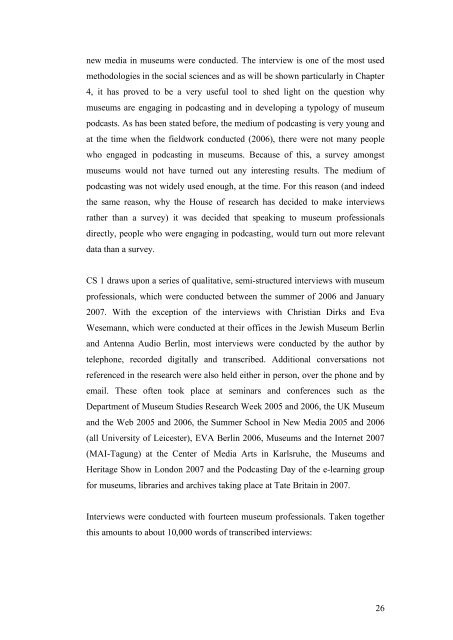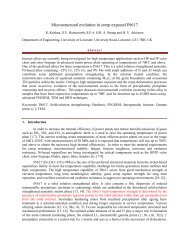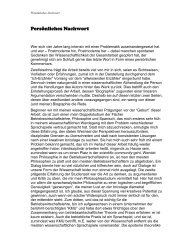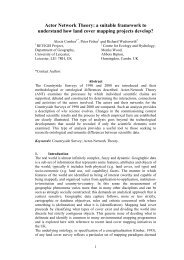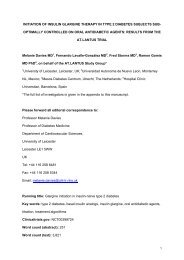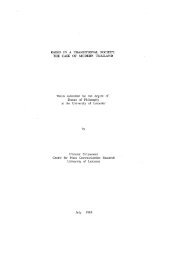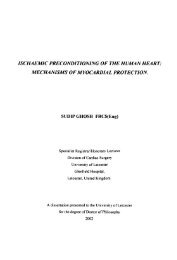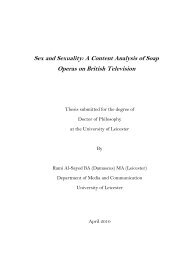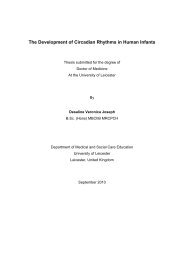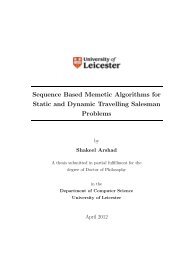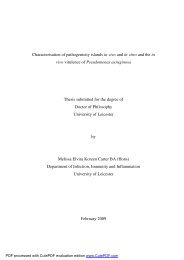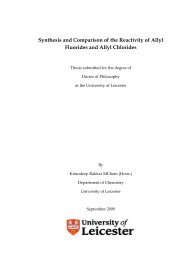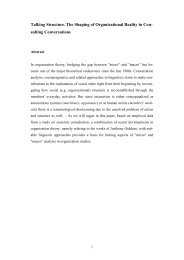- Page 1 and 2: Researching podcasting in museums:
- Page 3 and 4: TABLE OF CONTENTS ABSTRACT ........
- Page 5 and 6: DEVELOPING A TYPOLOGY OF MUSEUM POD
- Page 7 and 8: TABLE OF FIGURES Figure 1 Three sta
- Page 9 and 10: Figure 33 What listening media are
- Page 11 and 12: est of the support staff, particula
- Page 13 and 14: Marie Maculan, who have most genero
- Page 15 and 16: INTRODUCTION This research is conce
- Page 17 and 18: Polish or indeed in many other Euro
- Page 19 and 20: an online experience of art might b
- Page 21 and 22: eal opportunity for museums to reac
- Page 23 and 24: METHOD AND METHODOLOGIES Largely du
- Page 25: it could be employed and after a fe
- Page 29 and 30: put into groups, based on the topic
- Page 31 and 32: theoretical study of how to ask que
- Page 33 and 34: Critical Discourse Analysis 35 Duri
- Page 35 and 36: professionals encountered at the 20
- Page 37 and 38: The questions of the case study are
- Page 39 and 40: The stage of explanation, as regard
- Page 41 and 42: CHAPTER 1 Has the Web made art more
- Page 43 and 44: Other digitisation projects of muse
- Page 45 and 46: It needs to be pointed out, though,
- Page 47 and 48: The data collected for this researc
- Page 49 and 50: Mediathek further explained that
- Page 51 and 52: for enjoyment and learning. But the
- Page 53 and 54: Correspondingly, Roberta Buiani pos
- Page 55 and 56: What the above discussions suggest
- Page 57 and 58: 2 CHAPTER 2 Authenticity and Origin
- Page 59 and 60: Age an authentic museum experience
- Page 61 and 62: likely begin to erode. And when mem
- Page 63 and 64: Most notably, there is a shift in t
- Page 65 and 66: them in a new interpretative frame.
- Page 67 and 68: of the work may be authentic. Below
- Page 69 and 70: some people that are experiencing t
- Page 71 and 72: Now, comparing the abovementioned v
- Page 73 and 74: image, from museum as place for the
- Page 75 and 76: station, Shackleton’s grave, a co
- Page 77 and 78:
attendants at the Louvre recently w
- Page 79 and 80:
focused it is necessary to specify
- Page 81 and 82:
In order to keep the focus of this
- Page 83 and 84:
ideas of museum websites, and the m
- Page 85 and 86:
passive consumer of content, the la
- Page 87 and 88:
they can allow access to databases
- Page 89 and 90:
The complimentary site refers to wh
- Page 91 and 92:
the future, which he in reference t
- Page 93 and 94:
However, even if museologists often
- Page 95 and 96:
which exists as completely independ
- Page 97 and 98:
make links between various objects.
- Page 99 and 100:
what to expect in the galleries, wi
- Page 101 and 102:
constitute a small portion of a mus
- Page 103 and 104:
learner” is emerging. (Original e
- Page 105 and 106:
of updates to a large number of int
- Page 107 and 108:
problems. Users can subscribe to to
- Page 109 and 110:
saw the Web as a means to integrate
- Page 111 and 112:
archive in Vienna.” 210 The above
- Page 113 and 114:
Figure 10 Gilbert and George video
- Page 115 and 116:
“in the early days, leading up to
- Page 117 and 118:
programme for concentrated listenin
- Page 119 and 120:
With Tate Shots, a series of new vi
- Page 121 and 122:
in Germany, Austria and Switzerland
- Page 123 and 124:
from people with very diverse backg
- Page 125 and 126:
preparing a visit or finding the sh
- Page 127 and 128:
232 Ibid. 233 Ibid. Figure 17 A wor
- Page 129 and 130:
interests are, is important if muse
- Page 131 and 132:
4 CHAPTER 4 Evaluating the feasibil
- Page 133 and 134:
podcasting was conducted by Pew Int
- Page 135 and 136:
ecome very popular since the launch
- Page 137 and 138:
Berlin and discussed the many ways
- Page 139 and 140:
themselves. On the one hand, it wil
- Page 141 and 142:
What this shows is that whether lar
- Page 143 and 144:
note here that whereas museum profe
- Page 145 and 146:
clearer in Case Study 3, there are
- Page 147 and 148:
visitors. It can provide a very use
- Page 149 and 150:
No sensible person would say that i
- Page 151 and 152:
Again, it is the SFMOMA, which has
- Page 153 and 154:
It is probably too early to assess
- Page 155 and 156:
podcasting is fostering a range of
- Page 157 and 158:
National Museums of Berlin podcast
- Page 159 and 160:
5.8 Podcasts for before or after a
- Page 161 and 162:
Figure 23 Dulwich Picture Gallery
- Page 163 and 164:
previews the Velazquez exhibition a
- Page 165 and 166:
There is also another dimension to
- Page 167 and 168:
the show aims to highlight that St.
- Page 169 and 170:
types of podcasts primarily serve a
- Page 171 and 172:
sixteen minutes long, which is slig
- Page 173 and 174:
guide format: Curator-led tours or
- Page 175 and 176:
emains the same, which is one of th
- Page 177 and 178:
The author’s experience as a writ
- Page 179 and 180:
people with visual impairments to e
- Page 181 and 182:
understanding of the audience and h
- Page 183 and 184:
case leads one to go and see it, ev
- Page 185 and 186:
Listen to lectures in museums It se
- Page 187 and 188:
adio shows, or that they can serve
- Page 189 and 190:
hour and a half of a conference in
- Page 191 and 192:
time. This person might not be awar
- Page 193 and 194:
merely provide content as podcast b
- Page 195 and 196:
Related to the question of how freq
- Page 197 and 198:
AEC’s podcasts, but have not list
- Page 199 and 200:
whether Nationalgalerie or Kunsthal
- Page 201 and 202:
Have you ever listened to the Ars E
- Page 203 and 204:
many, i.e. 12 respondents, have sai
- Page 205 and 206:
Have you ever downloade d a museum'
- Page 207 and 208:
Among all the 116 respondents, 90 h
- Page 209 and 210:
two users who are consuming podcast
- Page 211 and 212:
Another interesting outcome is that
- Page 213 and 214:
are using podcasts on the move are
- Page 215 and 216:
everyday life. It accepts that ther
- Page 217 and 218:
7.3 Podcasting at the San Francisco
- Page 219 and 220:
The following section will cite an
- Page 221 and 222:
also he must have had also access t
- Page 223 and 224:
As regards formality, one of the fi
- Page 225 and 226:
very much. Yes, they are speaking i
- Page 227 and 228:
The press release goes on describin
- Page 229 and 230:
RF does not really describe it at a
- Page 231 and 232:
RF also constructs a social relatio
- Page 233 and 234:
In the first part of the above sent
- Page 235 and 236:
new types of content. With the podc
- Page 237 and 238:
Question 5: Does the podcast reflec
- Page 239 and 240:
7.4.5 Explanation The interpretatio
- Page 241 and 242:
institution.” 359 As has been sho
- Page 243 and 244:
anything. Whether a podcast can con
- Page 245 and 246:
manageable proportions as well as t
- Page 247 and 248:
Based upon these discussions, Chapt
- Page 249 and 250:
A podcast is not an Audio Newslette
- Page 251 and 252:
few examples, which show a truly pr
- Page 253 and 254:
has shown that podcast users tend t
- Page 255 and 256:
there. In short, it is difficult to
- Page 257 and 258:
Discourse In this study the term di
- Page 259 and 260:
programme may be consumed, streamin
- Page 261 and 262:
Dave Anderson (Towneley Hall): It s
- Page 263 and 264:
Reactions of colleagues on podcasti
- Page 265 and 266:
How do people develop a format for
- Page 267 and 268:
Der Wunsch der Museen nach qualitä
- Page 269 and 270:
take advantage of this new technolo
- Page 271 and 272:
Listening to the interviews you hav
- Page 273 and 274:
happy to answer technical questions
- Page 275 and 276:
unterschiedlichen Formaten der Ger
- Page 277 and 278:
subscribed to a particular RSS feed
- Page 279 and 280:
Now you are working with Antenna Au
- Page 281 and 282:
etween the two, a USB mixer called
- Page 283 and 284:
How easy is it to create RSS feeds?
- Page 285 and 286:
APPENDIX 2 Questionnaire for the Us
- Page 287 and 288:
No, I prefer conventional audio gui
- Page 289 and 290:
BIBLIOGRAPHY Aaken, G. v., Ich bin
- Page 291 and 292:
----------, Language and Power. Sec
- Page 293 and 294:
Keller, R., Diskursforschung. Eine
- Page 295 and 296:
&en=e3122c5982dec40b&ei=5088&partne
- Page 297 and 298:
Understanding the Future: Museums a
- Page 299 and 300:
Cultural Broadcasting Archive http:
- Page 301 and 302:
Petrie Museum http://www.petrie.ucl


